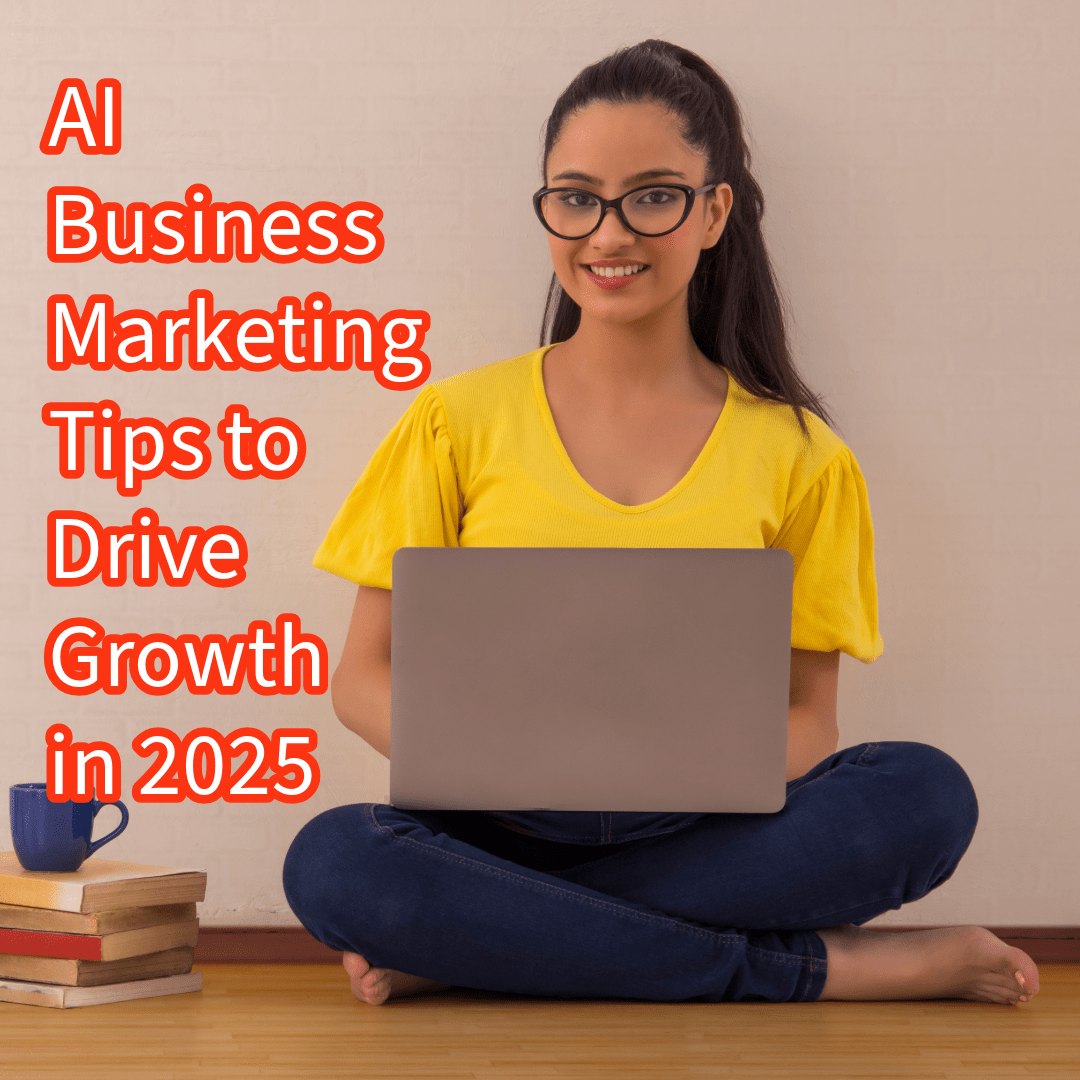
In today’s fast-paced digital landscape, artificial intelligence (AI) is no longer a futuristic concept—it’s an essential tool reshaping how businesses approach marketing.
As we enter 2025, companies of all sizes have a unique opportunity to harness AI-driven solutions to drive growth, enhance customer engagement, and outperform competitors.
Here are some AI business marketing tips to boost growth in 2025, backed by data-driven strategies, personalization, automation, and ethical practices.
AI Business Marketing – Tips to Drive Growth in 2025

Embracing the AI Revolution in Marketing
Over the past decade, AI has transitioned from experimental applications to mainstream business solutions. Marketers now rely on AI-powered analytics to sift through massive amounts of data, identify trends, and predict customer behavior.
In 2025, the competitive edge belongs to those who adopt these technologies and integrate them into their marketing strategies.
AI’s ability to process real-time data and optimize campaigns on the fly means that businesses can adjust their strategies almost instantaneously, ensuring they remain relevant in an ever-changing marketplace.

AI Business Marketing Tips
- Leverage Data-Driven Insights
Data is the lifeblood of modern marketing, and AI can unlock its full potential. In 2025, the success of your marketing efforts will depend on how well you can analyze and act upon customer data.
Here are several ways to leverage data-driven insights.
Customer Segmentation: Use AI algorithms to segment your audience based on behavior, demographics, and past interactions. This level of segmentation enables targeted campaigns that resonate with each subgroup.

Predictive Analytics: AI-powered predictive analytics can forecast trends and customer behaviors, allowing you to allocate your budget more effectively and predict market shifts before they occur.
Real-Time Analytics: With AI, you can monitor campaign performance in real-time, making adjustments on the fly. This agility helps maximize ROI and ensures that marketing efforts remain aligned with customer needs.
By embracing data-driven strategies, you can drive higher engagement and conversion rates.
- Personalize the Customer Experience
Personalization remains a cornerstone of successful marketing, and AI takes it to a new level. Today’s consumers expect interactions that feel tailored specifically to them.
AI can analyze vast amounts of data to identify patterns in customer behavior, allowing you to create personalized experiences at scale.

Here’s how to implement effective personalization.
Customized Content: Use AI to generate personalized content recommendations, email campaigns, and targeted advertisements based on individual preferences and previous interactions.
Dynamic Website Experiences: AI-powered platforms can alter website content in real-time, ensuring visitors see content relevant to their interests.
Customer Journey Mapping: Through machine learning, AI can map detailed customer journeys, identifying pain points and opportunities to enhance the experience.
By implementing AI-driven personalization strategies, businesses can build stronger relationships with their customers, increase engagement, and drive conversions.
- Automate Your Marketing Efforts
Marketing automation has been evolving rapidly, and AI is at the heart of this transformation. Automation tools powered by AI can manage repetitive tasks, freeing up your team to focus on creative strategy and high-level decision-making.

Consider these automation strategies.
Email Marketing: AI can segment your audience and personalize email content, ensuring that the right message reaches the right person at the right time. Automated email workflows can nurture leads through the sales funnel with minimal manual intervention.
Social Media Management: AI tools can schedule posts, monitor engagement, and suggest the best times to publish content based on your audience’s behavior.
Campaign Optimization: AI algorithms continuously test and optimize ad campaigns, adjusting bids, targeting, and creative elements to maximize ROI.
By automating repetitive tasks, you can reduce operational costs, and ensure consistency across your campaigns, leading to improved performance and growth.
- Enhance Content Creation with AI
Content is still king in digital marketing, but creating quality content that resonates with your audience can be challenging. AI offers innovative solutions to streamline the content creation process while maintaining high quality.

Here’s how AI can enhance content creation.
Content Generation: Advanced AI writing tools can help generate blog posts, social media content, and video scripts. These tools are useful for producing drafts that can then be refined by human editors.
Content Curation: AI can sift through vast amounts of information to curate relevant content, helping marketers stay up-to-date with industry trends and deliver value to their audience.
SEO Optimization: AI-driven platforms can optimize content for search engines by suggesting relevant keywords, meta descriptions, and headlines, ensuring that your content reaches your target audience.
Integrating AI into your content strategy speeds up the creation process and ensures content is optimized for engagement and discoverability.
- Optimize Customer Engagement with Chatbots
Customer service is a critical component of the customer experience, and AI-powered chatbots have revolutionized how businesses interact with their customers.
In 2025, deploying sophisticated chatbots can enhance customer engagement.

Consider these benefits.
24/7 Availability: AI chatbots can provide 24/7 customer support, handle inquiries, solve problems, and guide users through the sales process without human intervention.
Personalized Interactions: Modern chatbots can use past interaction data to offer personalized assistance, making the conversation more human and relevant.
Cost Efficiency: By automating routine customer service tasks, chatbots reduce the need for large customer support teams, allowing you to allocate resources to more strategic initiatives.
Effective use of AI chatbots improves customer satisfaction and contributes to operational efficiency, driving growth by creating a seamless customer journey.
- Prioritize AI Ethics and Transparency
As AI becomes integral to business marketing, ethical considerations must remain at the forefront of any strategy. Consumers are becoming more aware of how their data is used and expect businesses to operate transparently.

Here are some ethical considerations.
Data Privacy: Ensure that all AI systems comply with data protection regulations. Transparency about data collection and usage builds trust with your audience.
Bias Mitigation: AI algorithms can sometimes reflect or amplify biases present in the training data. Regular audits and updates to your AI models are essential to minimize bias and ensure fair treatment of all customers.
Clear Communication: Be transparent about how AI is used in your marketing efforts. Whether it’s personalized recommendations or automated customer service, clear communication about AI’s role can build credibility and trust.
By prioritizing ethics and transparency, businesses can avoid potential pitfalls and foster long-term customer loyalty.
- Integrate Multichannel Marketing Strategies
Today’s customers interact with brands across multiple channels—from social media and email to mobile apps and websites.

AI can help integrate these diverse channels into a cohesive marketing strategy.
Unified Customer Profiles: AI-powered systems can aggregate data from various touchpoints to create a single, comprehensive view of the customer. This unified profile enables more effective segmentation and targeting.
Consistent Messaging: With AI, you can ensure that your brand’s messaging is consistent across all channels, reinforcing brand identity and improving customer experience.
Cross-Channel Analytics: AI can analyze the performance of your marketing campaigns across different channels, providing insights into where your strategy is succeeding and where adjustments are needed.
A well-integrated multichannel approach powered by AI ensures that you meet customers wherever they are, creating a seamless brand experience that drives growth.
- Foster a Culture of Innovation and Continuous Learning
The AI landscape is evolving, and staying ahead requires a commitment to innovation and continuous learning. Businesses that embrace change and invest in ongoing education for their teams are better positioned to leverage new AI technologies effectively.

Consider the following steps.
Training and Development: Regular training sessions on the latest AI tools and techniques can empower your marketing team to use these technologies more effectively.
Cross-Functional Collaboration: Encourage collaboration between departments—marketing, IT, data science, and customer service—to ensure a holistic approach to AI implementation.
Experimentation: Foster experimentation. Use pilot projects and A/B testing to explore new AI applications, learn from failures, and refine strategies based on what works best for your audience.
By cultivating a culture of innovation, your organization can adapt quickly to changes in the AI landscape, ensuring sustained growth and competitive advantage in 2025.

Artificial intelligence will redefine the marketing landscape in 2025, offering unprecedented opportunities for businesses to drive growth through data-driven insights, personalized experiences, and operational efficiency.
As we move further into the digital age, the integration of AI into business marketing is a necessity. Embrace these AI-driven strategies to unlock new opportunities, streamline your operations, and propel your business forward in 2025.
Whether you’re a seasoned marketer or just beginning to explore AI, these tips provide a roadmap for leveraging technology to achieve remarkable growth and set your brand apart in an increasingly competitive market.
AI Tools for You
https://www.bestprofitsonline.com/myblog/newai
Tip
How To Improve Your Social Media Marketing
